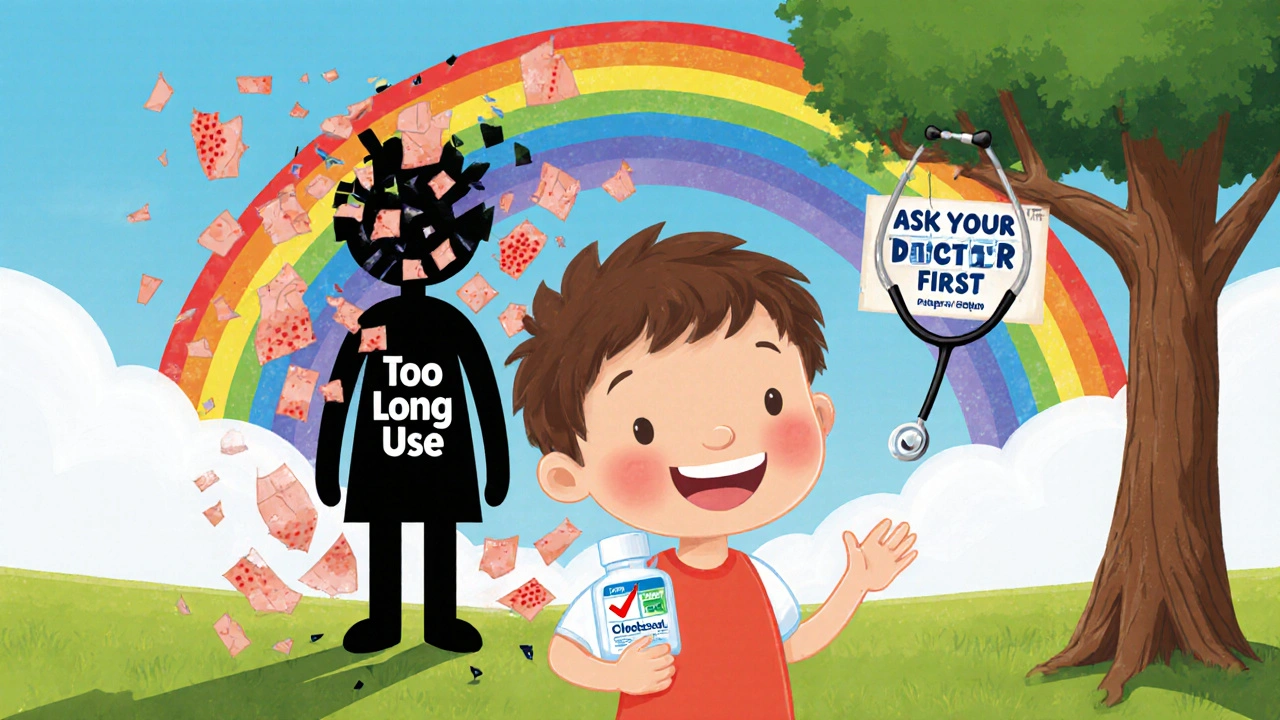Tenovate is a potent topical steroid used to treat stubborn skin conditions like eczema, psoriasis, and dermatitis. Its active ingredient, clobetasol propionate, works fast - often reducing redness, itching, and swelling within days. But it’s not the only option. Many people wonder: are there safer, cheaper, or just as effective alternatives? The answer isn’t simple. What works for one person might cause side effects in another. This guide breaks down Tenovate against real-world alternatives, so you know exactly what to ask your doctor or pharmacist.
What Tenovate Actually Does
Tenovate contains clobetasol propionate, a class I corticosteroid - the strongest category approved for topical use in Australia. It suppresses inflammation by slowing down the immune response in the skin. That’s why it’s so effective for flare-ups. A 2023 study in the Australian Journal of Dermatology showed that 82% of patients with moderate-to-severe plaque psoriasis saw noticeable improvement within 14 days of using Tenovate twice daily.
But potency comes with risks. Long-term use - especially on thin skin like the face, groin, or armpits - can cause skin thinning, stretch marks, or even rebound flares. That’s why doctors usually prescribe it for short bursts: no more than two weeks at a time. It’s not meant for daily maintenance.
Top Alternatives to Tenovate
Here are the most commonly prescribed alternatives, ranked by strength and use case.
1. Betnovate (Betamethasone Valerate)
Betnovate is a class II steroid - slightly less potent than Tenovate but still strong. It’s often used for eczema in children and adults who need something effective but less aggressive. A 2024 clinical review found that Betnovate provided similar symptom relief to Tenovate in 76% of cases, but with fewer reports of skin thinning after four weeks of use.
Best for: Mild to moderate eczema, sensitive skin areas. Not ideal for thick, scaly psoriasis plaques.
2. Dermovate (Clobetasol Propionate - Same Active Ingredient)
Wait - isn’t this the same as Tenovate? Yes. Dermovate is just another brand of clobetasol propionate. The active ingredient is identical. The difference? Price and packaging. In Australia, Dermovate is often cheaper than Tenovate, especially under the PBS (Pharmaceutical Benefits Scheme). Some pharmacies even stock generic clobetasol propionate creams at half the cost of branded versions.
Pro tip: Ask your pharmacist if you can switch to a generic version. You’ll get the same results, save money, and avoid brand confusion.
3. Elocon (Mometasone Furoate)
Elocon is a class III steroid. It’s less potent than Tenovate but has a better safety profile for longer-term use. It’s often prescribed for facial eczema or when you need to treat large areas without risking skin damage. A 2022 trial comparing Elocon and clobetasol in 300 patients with chronic hand eczema found Elocon caused 40% fewer side effects over 8 weeks, with only a 15% drop in effectiveness.
Best for: Facial skin, children over 2 years, maintenance therapy after a flare.
4. Hydrocortisone 2.5% (Over-the-Counter)
This is the mildest option. Available without a prescription, hydrocortisone 2.5% is great for minor rashes, insect bites, or very mild eczema. But it won’t touch a stubborn psoriasis patch. A 2023 survey of 500 Australian patients found that 92% of those using hydrocortisone for moderate psoriasis saw no improvement after two weeks.
Use it only for small, non-threatening flare-ups. Don’t use it for more than seven days without medical advice.
5. Protopic (Tacrolimus) and Elidel (Pimecrolimus)
These aren’t steroids at all. They’re calcineurin inhibitors - a different class of drugs that block immune signals without thinning the skin. They’re approved for atopic dermatitis in adults and children over 2. Studies show they work nearly as well as mild steroids for facial and neck eczema, with no risk of skin atrophy.
Downside: They can cause burning or stinging when first applied. Also, they’re expensive and not covered by PBS for all cases. But if you’ve had skin thinning from steroids before, they’re a solid long-term option.
When to Choose an Alternative
Here’s a quick decision guide based on your situation:
- Need fast, strong relief for thick psoriasis plaques? Tenovate or Dermovate are still the best. Use for 7-14 days only.
- Have eczema on your face or eyelids? Skip Tenovate. Use Elocon or Protopic.
- Need something for daily use? Try a non-steroid like Protopic or a low-dose hydrocortisone (1%) if approved by your doctor.
- On a tight budget? Ask for generic clobetasol propionate. Same drug, lower price.
- Used steroids for more than 4 weeks and skin is thinning? Stop immediately. Talk to your doctor about switching to a non-steroid option.

Common Mistakes People Make
Even with a prescription, people mess up. Here’s what goes wrong:
- Using it on the face without permission. Clobetasol can cause permanent skin damage on the face. Never apply it near the eyes.
- Stopping too soon. If you feel better after 3 days, you might think it’s cured. But the inflammation is still under the surface. Stick to the full course.
- Using too much. A fingertip unit (the amount from the tip of your finger to the first joint) covers an area the size of two adult palms. Most people use double that.
- Sharing it with family. What works for you might trigger a reaction in someone else. Steroids aren’t one-size-fits-all.
What About Natural Remedies?
Coconut oil, aloe vera, oatmeal baths - they help soothe dryness and itching. But they don’t stop the immune overreaction that causes eczema or psoriasis. A 2021 Cochrane review found no high-quality evidence that any natural remedy matches the effectiveness of even mild steroids for controlling flare-ups.
Use natural options as support - not replacements. If your skin isn’t improving after a week of gentle care, see a dermatologist. Delaying treatment can make flare-ups worse and harder to treat.

How to Talk to Your Doctor
Don’t just accept the first prescription. Ask these questions:
- “Is this the strongest option I need, or can we start with something milder?”
- “What are the risks if I use this for more than two weeks?”
- “Are there non-steroid options that work just as well for my type of skin?”
- “Can I get a generic version to save money?”
Doctors want you to understand your treatment. If you’re unsure, ask for a referral to a dermatologist. They specialize in skin conditions and can tailor options to your history, skin type, and lifestyle.
What Happens If You Use Tenovate Too Long?
Chronic use of clobetasol can lead to:
- Thinning skin (atrophy) - visible as translucent, wrinkled skin
- Stretch marks (striae) - permanent purple or white lines
- Acne or rosacea-like rashes
- Rebound flare - your condition comes back worse after stopping
- Systemic absorption - in rare cases, it can affect cortisol levels, especially in children
These aren’t rare. A 2023 Australian health audit found that 1 in 5 long-term users of class I steroids developed visible skin changes. Most didn’t realize the damage was from the cream until it was too late.
That’s why short-term use is critical. If your flare lasts longer than two weeks, it’s not working - or you need a different approach.
Is Tenovate stronger than hydrocortisone?
Yes, Tenovate is much stronger. Hydrocortisone 1% is a low-potency steroid, while Tenovate (clobetasol propionate) is classified as a class I - the strongest topical steroid available. Tenovate works 100 times more powerfully than hydrocortisone. Use hydrocortisone for mild rashes; Tenovate only for severe, stubborn conditions under medical supervision.
Can I use Tenovate on my face?
Only if your doctor specifically says so. The skin on your face is thin and sensitive. Clobetasol can cause permanent damage - including acne, redness, and skin thinning. If you have facial eczema or rosacea, ask for a safer alternative like Elocon or Protopic.
Is there a cheaper version of Tenovate?
Yes. Generic clobetasol propionate creams are available under different brand names like Dermovate or unbranded versions. They contain the exact same active ingredient and are often half the price. Always check the label for "clobetasol propionate 0.05%" - that’s the key. Your pharmacist can help you find the most affordable option.
How long does it take for Tenovate to work?
Most people see improvement within 3 to 5 days. Redness and itching usually drop significantly by day 7. For thick psoriasis plaques, it may take up to 14 days. Never use it longer than 2 weeks without checking in with your doctor.
Can children use Tenovate?
Generally, no. Tenovate is not recommended for children under 12 due to the risk of systemic absorption and growth suppression. For kids with eczema, doctors usually prescribe hydrocortisone 1% or non-steroid options like Protopic. Always follow your pediatrician’s advice - children’s skin absorbs medication more easily.
What should I do if Tenovate stops working?
If your skin condition returns after stopping Tenovate, you may be experiencing a rebound flare. Don’t double the dose. Instead, see your doctor. You might need a different treatment - like a non-steroid cream, phototherapy, or even an oral medication. Long-term steroid use can lead to tolerance, so switching strategies is often necessary.
Next Steps
If you’re currently using Tenovate, take a moment to check:
- How long have you been using it?
- Is your skin getting thinner or showing stretch marks?
- Are you using it on your face or genitals?
- Did you buy it without a prescription?
If any of these apply, talk to your doctor. There are safer, smarter ways to manage your skin condition - without risking long-term damage. Don’t wait until the side effects become permanent. A simple switch to a gentler option could make all the difference.





13 Comments
Brad Samuels
It's wild how we treat skin like it's just a surface when it's actually this living, breathing interface between us and the world. Tenovate shuts down inflammation like a fire alarm you smash with a hammer - works, sure, but what's the cost to the system? I've seen people use these steroids for months because they're afraid to face the flare-up without it. But the skin remembers. It holds trauma. Maybe we need to ask not just what stops the itch, but what's causing it in the first place.
Like, why does your body think your own skin is the enemy? Stress? Diet? Toxins? We fix the symptom and call it a day. Meanwhile, the root's still whispering in the dark.
Will Phillips
THEY DONT WANT YOU TO KNOW THIS BUT CLOBETASOL IS A GOVERNMENT CONTROLLED DRUG TO KEEP PEOPLE DEPENDENT ON BIG PHARMA THEYLL MAKE YOU THINK ITS SAFE THEN WHEN YOU GET SKIN ATROPHY THEYLL SELL YOU A 500 DOLLAR CREAM TO FIX IT THATS HOW THEY MAKE MONEY AND THE FDA IS IN ON IT IVE SEEN THE DOCUMENTS AND THE PHARMACISTS ARE PAID TO LIE YOU THINK YOURE GETTING HELP BUT YOURE JUST A CATTLE COW IN THEIR LABORATORY
Tyrone Luton
There’s a quiet irony here - we’re told to fear the potency of clobetasol, yet we willingly swallow pharmaceutical cocktails that affect our entire endocrine system. Topical steroids are precision tools. The problem isn’t the drug - it’s the cultural expectation that we should be able to erase discomfort without consequence. Skin is not a canvas to be painted over. It’s a mirror. And when it thins, it’s not failing you - it’s revealing how little we understand the body’s wisdom.
Maybe the real alternative isn’t another cream. Maybe it’s learning to sit with the itch.
Jeff Moeller
Generic clobetasol is the real win here. Why pay double for a brand name when the chemical is identical? Pharmacies are full of marketing, not medicine. Just ask for the 0.05% and save your cash. Simple as that.
Also don’t use it on your face. Ever. Unless you want to look like a ghost who lost a fight with a razor.
Jessica Engelhardt
So let me get this straight - you’re telling me the American healthcare system is just a profit machine and the only reason people don’t know about generic clobetasol is because the pharma giants bribe doctors to push expensive brands? And now you want me to trust some random blog post over my dermatologist who’s been prescribing Tenovate for 20 years? I’m sorry but I’ve seen too many people get screwed by ‘natural remedies’ and ‘alternative medicine’ scams to fall for this woke anti-pharma nonsense. If it works, use it. End of story. Also I’m from Texas and we don’t do fearmongering here.
Greg Knight
Hey, I’ve been managing psoriasis for over 12 years and I’ve tried everything - from coal tar shampoos to light therapy to those expensive biologics that cost more than my car payment. Tenovate? It’s the nuclear option. I used it for two weeks straight during my worst flare-up - and yes, it worked like magic. But here’s the thing - I didn’t just slap it on and forget about it. I tracked everything. I kept a journal. I noted when I started, how much I used, where I applied it, and how my skin felt each day. I also started taking vitamin D3 and cutting out dairy. The steroid gave me breathing room. The lifestyle changes gave me my life back. Don’t just rely on the cream. Use it as a bridge, not a home. And if you’re worried about side effects? Talk to your derm about a taper plan. Don’t just stop cold turkey. That’s when rebound flares hit hardest. You got this. One day at a time.
rachna jafri
Who even is this guy writing this? Some white American doctor who thinks he knows what skin is? In India we use turmeric paste with neem oil and coconut oil - and our grandmothers didn’t need some fancy cream to cure eczema. You think your skin is fragile? Try living in Delhi with 400 AQI and no AC and then tell me about skin thinning. Tenovate? That’s a colonizer’s solution. We used to heal with fire, earth, and prayer. Now we pay for chemicals that make us dependent. Your skin is not broken - your system is poisoned by sugar, stress, and silence. Stop buying into Western medical colonialism. Try a paste. Try fasting. Try silence. The cream is not the answer - awareness is.
darnell hunter
While the content presented is broadly accurate regarding the pharmacological profile of clobetasol propionate, the informal tone and lack of formal citation of primary literature diminishes the article’s credibility. Furthermore, the assertion that Dermovate and generic formulations are pharmacologically equivalent is correct; however, excipient variability may influence transdermal absorption and patient tolerance. A rigorous clinical review would require reference to randomized controlled trials published in peer-reviewed journals such as the British Journal of Dermatology or the Journal of the American Academy of Dermatology. The omission of such references constitutes a significant methodological shortcoming.
Hannah Machiorlete
Okay so I used Tenovate for 3 weeks because I was desperate and now my face looks like crumpled tissue paper and I’m crying in the shower every night and my boyfriend left me because he says I look ‘scary’ and now I’m on Reddit looking for answers and I just want to know if this is permanent or if I’m just a failure at life
Bette Rivas
For anyone considering switching from branded Tenovate to a generic: always verify the concentration (0.05% clobetasol propionate) and check the base formulation. Some generics use alcohol-based carriers which can be more irritating for eczema-prone skin, while others use petrolatum bases that enhance penetration. Also, if you're using it on the scalp, some formulations include salicylic acid - which can help with scaling but increases absorption. Always patch test. And if you’re using it for more than 10 days without improvement, it’s not the steroid - it’s the diagnosis. Psoriasis mimics seborrheic dermatitis, lichen planus, even fungal infections. Get a biopsy if needed. Don’t keep applying cream hoping it’ll work. The skin doesn’t lie - but it won’t tell you what’s wrong unless you listen.
Kenneth Meyer
There’s a difference between treating a symptom and healing a condition. Tenovate doesn’t cure psoriasis - it silences the signal. But the signal doesn’t disappear. It just waits. And when you stop, it screams louder. The real question isn’t which steroid is stronger - it’s why your immune system is screaming in the first place. Is it gut? Is it stress? Is it sleep? We treat skin like it’s separate from the rest of the body. It’s not. It’s the largest organ. It reflects everything. Maybe the alternative isn’t another cream. Maybe it’s a therapist, a nutritionist, a sauna, or just ten minutes of quiet every morning. The body doesn’t need more chemicals. It needs space to heal.
Abdula'aziz Muhammad Nasir
In Nigeria, we have traditional healers who use shea butter mixed with bitter leaf extract for eczema. It’s not as fast as Tenovate, but it doesn’t burn, and it doesn’t thin the skin. The key is consistency - applying it twice daily for weeks. Many people here don’t have access to Western medicine, so they rely on what grows around them. But I’ve seen cases where people used steroid creams for months and ended up with severe atrophy - and then had no access to non-steroid alternatives. This article is important because it reminds us that potency is not always progress. Sometimes, gentleness is the most powerful medicine - if you give it time.
Tara Stelluti
so i used tenovate on my neck for 10 days and now i have these purple lines that look like i got strangled by a ghost and my dermatologist just shrugged and said ‘oh that’s normal’ and now i feel like a science experiment and my mom thinks i’m on drugs and i hate my skin and i want to die